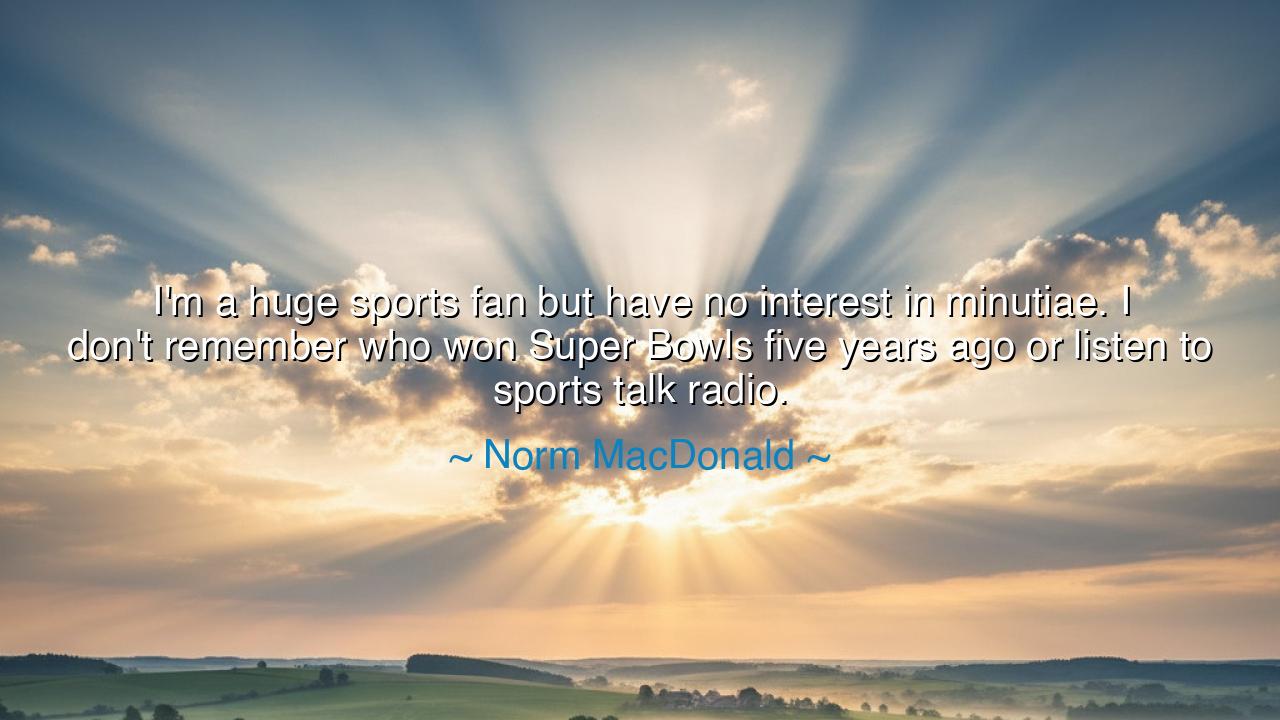
I'm a huge sports fan but have no interest in minutiae. I don't
I'm a huge sports fan but have no interest in minutiae. I don't remember who won Super Bowls five years ago or listen to sports talk radio.






When Norm MacDonald declared, “I’m a huge sports fan but have no interest in minutiae. I don’t remember who won Super Bowls five years ago or listen to sports talk radio,” he was speaking with the wisdom of one who saw through the noise and reached for the essence of joy. His words remind us that to love sports is not necessarily to memorize its endless trivia, but to feel its pulse, its drama, and its humanity. He separates the soul of the game from the dust of details, pointing us toward what truly matters.
The ancients themselves would have understood this. They gathered in Olympia not to debate every past result or dissect every minor play, but to watch with reverence the spectacle of speed, strength, and courage. They marveled at the excellence of the competitors, at the spirit of arete—excellence of body and soul—rather than cataloging who won which event a decade earlier. Norm’s insight is the echo of that truth: it is the spirit of play that matters, not the ledger of statistics.
In saying he cared little for minutiae, MacDonald teaches us that obsession with details can blind us to the larger beauty. One may know every score, every player’s name, every number, and yet miss the sheer wonder of watching a team rise from behind, or the noble sight of an athlete pushing beyond pain. In this way, he reminds us that the essence of sport lies not in talk radio debates, but in the living, breathing spectacle of human struggle and triumph.
History offers a reflection in Homer’s Iliad. The poet does not dwell on every stroke of every sword, but elevates the great themes: the wrath of Achilles, the courage of Hector, the grief of Priam. It is not the minutiae of battle we remember, but the grandeur of human experience it revealed. Similarly, in sport, what endures is not the catalog of championships, but the unforgettable moments that capture the human heart—the underdog’s victory, the selfless pass, the comeback against all odds.
MacDonald’s approach carries with it also a kind of freedom. To detach from the endless chatter of statistics and arguments is to enjoy sport as it was meant to be enjoyed: as a game, a spectacle, a story of joy and heartbreak. It is to release oneself from the burden of being an archivist and instead become a participant in wonder. It is the difference between counting every star in the sky and simply marveling at its beauty.
The lesson here is simple yet profound: do not confuse the essence with the ornament. Love sports for the thrill of the game, for the unity it brings, for the courage it demands. Let go of the endless trivia that others demand you remember. What matters is not who won five years ago, but what you felt as you watched, and what truths of human striving the game revealed to you.
Practically, this means shifting your focus from the noise of statistics and arguments toward the deeper joys. Watch for the spirit of teamwork, the lesson of perseverance, the beauty of skill. Remember that life itself is the same: one may collect endless details of days gone by, but what matters most is whether one lived fully, felt deeply, and embraced the great stories unfolding before them.
Thus, Norm MacDonald’s words endure as wisdom cloaked in humor: do not lose yourself in minutiae—seek instead the heart of the game. For in sport, as in life, it is not the endless numbers that matter, but the living fire of the moment, the memory of courage, and the joy of being part of something greater than yourself.






AAdministratorAdministrator
Welcome, honored guests. Please leave a comment, we will respond soon